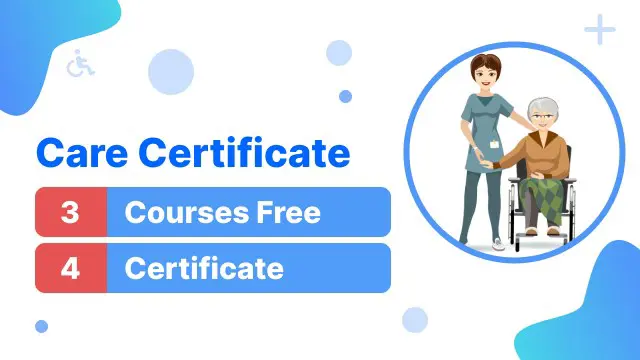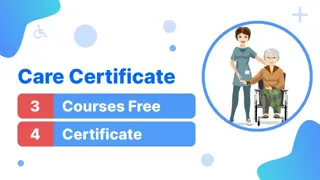
Care Certificate (Standards 1 to 15) with Level 2 Safeguarding Children Training
Instant Access | 3 Premium Courses & PDF Certificate as a Gift | *Winter Sale* | Standards 1-to-15 | 24/7 Tutor Support
Study Hunt
Summary
- Reed courses certificate of completion - Free
- Tutor is available to students
Add to basket or enquire
Overview
Care Certificate (Standards 1 to 15)
As per elfh, The Care Certificate is a set of standards developed for the health and care support workforce to support their induction and development. The Care Certificate provides a framework to ensure that all support workers have the same introductory skills, knowledge, and behaviours to offer compassionate, safe, and high-quality care in their workplace settings.
The Care Certificate consists of 15 standards that require theoretical study and practical application within the learner’s place of work. Apart from the 15 standards, you will get three additional modules (1, 2, and 18) to understand more in this course.
The Care Certificate should be used as part of your induction as it sets out fundamental skills you’ll need to work competently in health and social care.
This course is self-paced. You can study this Care Certificate course at your convenient time from wherever you want using any smart device. Moreover, if you face any problem accessing this premium course, you can contact our dedicated 24/7 customer support team, who will solve issues promptly.
So, without further delay, enrol in this course today, and gain a competitive advantage over your peers. Happy learning.
Please Note: You will not be awarded the Care Certificate after completing the Care Certificate Preparation course. However, this Care Certificate course covers the knowledge and theoretical components of the Care Certificate in-depth. It will prepare you for the certification recognised and provided by Health Education England, Skills For Health & Skills for Care.
Learning Outcomes of This Course
After completing this course, you will be able to -
- Describe the Health and Social Care Provision in the UK through Care Certificate
- Work in a team effectively after studying Care Certificate
- Define your role as a healthcare worker by Care Certificate
- Prepare and implement your personal development plan through Care Certificate
- Explain the duty of care in the Care Certificate
- Recognise equality and diversity through Care Certificate
- Work in a person-centred way at your workplace
- Develop your communication skills using the knowledge from Care Certificate
- Maintain privacy and dignity at work
- Understand the impact of fluid and nutrition and how to maintain the intake of those
- Apply the knowledge of mental health in caring for patients through Care Certificate
- Safeguard adults and children using the learning from Care Certificate
- Ensure health and safety at your workplace
Why Choose This From Us
- This Care Certificate course is developed by a relevant industry expert.
- Customised content to meet the demand of 21st-century workplaces.
- Self-paced course, supported on any device, i.e., desktop, laptop, smartphone, tab.
- Available TUTOR SUPPORT via email.
- Dedicated 24/7 customer support to solve all the queries from you.
- Budget-friendly course price.
- Entirely FREE PDF certificate.
Key Features
- 3 Courses Extra (Fully FREE)
- Total 4 PDF Certificate (No Hidden Cost)
- Instant e-certificate
- Developed by qualified professionals
- Lifetime Access
- Tutor Support
- Downloadable Modules as PDF Documents
Curriculum
-
Module 1: Health and Social Care Provision in the UK 15:00
-
Module 2: Working With Others, Teamwork 11:00
-
Module 3: Understanding Your Role 15:00
-
Module 4: Your Personal Development 15:00
-
Module 5: Duty of Care 13:00
-
Module 6: Equality and Diversity 14:00
-
Module 7: Working in a Person-centred Way 21:00
-
Module 8: Communication 18:00
-
Module 9: Privacy and Dignity 19:00
-
Module 10: Fluids and Nutrition 21:00
-
Module 11: Awareness of Mental Health, Dementia and Learning Disability 29:00
-
Module 12: Safeguarding Adults 17:00
-
Module 13: Safeguarding Children 16:00
-
Module 14: Basic Life Support 13:00
-
Module 15: Health and Safety 21:00
-
Module 16: Handling Information 12:00
-
Module 17: Infection Prevention and Control 18:00
-
Module 18: Frequently Asked Questions 18:00
-
GIFT COURSE 02 : Level 2 Safeguarding Children Training 1:03:00
Course media
Description
The curriculum of this Course
Module 1: Health and Social Care Provision in the UK
- Introduction
- Historical View
- The NHS in the Four Countries
- Provision of Services
- Regulation and Monitoring of Services
- Professional Regulation
- Primary Care Services
- Secondary Care Services
- Tertiary Care Services
- Ambulance Trusts
- Mental Health Trusts
- Community Health Services
- Social Care and Support
- Assessment of Care Needs
- Assessment of Health Needs
- Summary
Module 2: Working With Others, Teamwork
- Introduction
- Teamworking
- Teams and Teamworking
- Team Dynamics
- Barriers to Effective Teamworking
- Conflict
- Summary
Module 3: Understanding Your Role
- Introduction
- Who are You?
- Job Description
- Agreed Ways of Working
- Policies and Procedures
- Codes of Conduct
- Responsibility
- Accountability
- Delegation
- Relationships
- Summary
Module 4: Your Personal Development
- Introduction
- Lifelong Learning
- How Learning Takes Place, Learning Styles
- Strategies to Help With Learning
- Personal Development Plans
- Appraisal
- Your Personal Development Plan
- The Personal Development Portfolio
- Supervision
- Training and Development
- Core Learning
- Giving and Receiving Feedback
- Summary
Module 5: Duty of Care
- Introduction
- Duty of Care
- Your Duty of Care
- Concerns
- Promoting Independence
- Providing Information
- The Constitution, Complaints, Comments and Compliments
- Raising Concerns
- Untoward Incidents
- Negligence
- Conflict
- Responding to Conflict
- Summary
Module 6: Equality and Diversity
- Introduction
- Legislation
- Equality Duty
- Human Rights Act
- Defining Terms
- Labelling, Stereotyping and Prejudice
- Inequality
- People With Learning Disabilities and Those With Mental Health Problems
- Cultural Sensitivity
- Summary
Module 7: Working in a Person‐centred Way
- Introduction
- Working in a Person‐centred Way
- Person‐centred Values
- Enabling
- Coordinated Care
- Personalised Care
- Person‐centred Planning
- Supporting People
- Advanced Care Planning
- The Environment of Care
- Minimising Discomfort, Distress or Pain
- Responding to a Person’s Discomfort
- Self‐esteem
- Personal Identity
- Promoting Wellbeing, Identity and Self‐esteem
- Summary
Module 8: Communication
- Introduction
- Care, Compassion and Communication
- Communication
- Types of Communication
- Verbal Communication
- Non‐verbal Communication
- Working in Teams
- Communication and Language Needs
- Communication Aids
- Barriers to Effective Communication
- Strategies to Reduce Barriers to Communication
- Preserving Confidentiality
- Summary
Module 9: Privacy and Dignity
- Introduction
- Protecting Information
- Disclosure
- Implementing Respect, Privacy and Dignity
- Informed Choice and Choosing Options
- Assessing Risk
- Equality and Diversity
- Promoting Independence
- Summary
Module 10: Fluids and Nutrition
- Introduction
- Food and Drink Safety
- Protecting People
- Personal Protective Equipment in Food Hygiene
- Nutrition and Hydration
- The Eatwell Plate
- Hydration
- Poor Hydration and Nutrition
- Helping People With Their Nutrition and Hydration
- Summary
Module 11: Awareness of Mental Health, Dementia and Learning Disability
- Introduction
- Mental Health Conditions
- Service Provision
- Depression
- Anxiety
- Bipolar Disorder
- Psychosis
- Dementia
- Learning Disabilities
- The Social Model of Disability
- Assessing and Making a Diagnosis
- Mental Capacity
- Assessing Capacity
- Summary
Module 12: Safeguarding Adults
- Introduction
- Safeguarding
- Types of Harm and Abuse
- Safeguarding Vulnerable Adults: the Principles
- A Person‐centred Approach
- Safeguarding Adults Boards
- Identifying and Managing Risk
- Suspected or Disclosed Abuse
- Reporting Concerns
- Summary
Module 13: Safeguarding Children
- Introduction
- Safeguarding and Welfare
- Child Abuse and Maltreatment
- Impact of Parents or Carers on a Child’s Health and Wellbeing
- Types of Abuse
- Children and Social Media
- The Rights of the Child
- What to Do if You Have Concerns of Suspected or Alleged Abuse
- Escalating Concerns
- Summary
Module 14: Basic Life Support
- Introduction
- The Heart
- The Lungs
- Basic Life Support
- The AVPU Scale for Checking a Response
- Cardiopulmonary Resuscitation (CPR)
- Airway Obstruction
- Documentation
- Automatic External Defibrillators
- Summary
Module 15: Health and Safety
- Introduction
- The Law
- Health and Safety Policies
- Hazards in the Workplace
- Workplace Hazards
- Working With Hazardous Substances
- Reporting Health and Safety Hazards
- Risk Assessment
- Accidents and Incidents
- Medicines
- Moving, Handling and Assisting
- Fire Safety Awareness
- Working Safely
- Managing Stress
- Summary
Module 16: Handling Information
- Introduction
- Key Legislation
- The Electronic Patient Record
- Making Concerns Known
- The Use of Social Media
- Summary
Module 17: Infection Prevention and Control
- Introduction
- Roles and Responsibilities
- Transmission of Infection
- The chain of Infection
- Breaking the Chain
- Safe Disposal of Waste
- Sharps Disposal
- Safe Management of Laundry
- Personal Protective Equipment (PPE)
- Summary
Module 18: Frequently Asked Questions
- Introduction
- Summary
☞☞☞☞☞☞☞ GIFT COURSE 01 ☜☜☜☜☜☜☜☜☜☜☜
>>>>>> Level 2 Safeguarding Children Training <<<<<<<<
- Module 1: An Overview of Safeguarding Children
- Module 2: Understanding Child Abuse
- Module 3: Understanding Child Protection
- Module 4: Relevant Legislation
- Module 5: How to Respond to Disclosure
- Module 6: Responsibilities of Different Professionals
Certification
As soon as you complete this course successfully, you can claim your free pdf certificate. Next, you will find instructions on how to download the certificate.
Buying for Your Team?
You can buy this Care Certificate course for your colleague or members of your team by simply adding the course to the basket. You can add the student's details and a message at checkout.
Who is this course for?
The course is primarily prepared for the freshers in the healthcare sector. However, existing healthcare workers can also take this Care Certificate course to refresh their knowledge and skills in this field. Moreover, if you are working in any of the following roles, you must take this course.
- Healthcare Assistants
- Assistant Practitioners
- Care Support Workers
- Adult Social Workers
- Those giving support to clinical roles in the NHS where there is any direct contact with patients.
- Adult Social Care workers giving direct care in residential, nursing homes and hospices, home care workers, and domiciliary care staff.
Requirements
There is no prerequisite to enrolling in this course. However, you must be a continuous learner with a strong motivation in order to grasp the best out of this Care Certificate course.
Career path
This course will prepare you for different job roles in the healthcare sector. After completing this Care Certificate course, you can enhance your chances and explore the available opportunities.
Questions and answers
Currently there are no Q&As for this course. Be the first to ask a question.
Certificates
Reed courses certificate of completion
Digital certificate - Included
Will be downloadable when all lectures have been completed
Reviews
Legal information
This course is advertised on reed.co.uk by the Course Provider, whose terms and conditions apply. Purchases are made directly from the Course Provider, and as such, content and materials are supplied by the Course Provider directly. Reed is acting as agent and not reseller in relation to this course. Reed's only responsibility is to facilitate your payment for the course. It is your responsibility to review and agree to the Course Provider's terms and conditions and satisfy yourself as to the suitability of the course you intend to purchase. Reed will not have any responsibility for the content of the course and/or associated materials.


